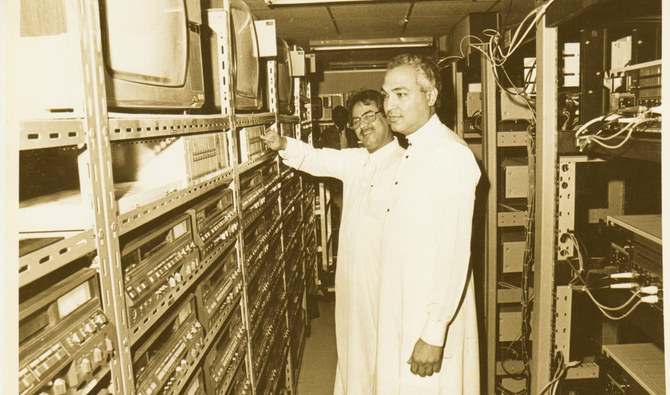JEDDAH: More than half a century ago, cinemas were a popular source of entertainment in major cities in the Kingdom. Westerners working for the California State Oil Company (later Aramco) were the first to introduce cinemas to Saudis, setting up large screens in their residential compounds during the 1930s to watch American and European films. Cinemas soon spread to the four major Saudi cities: Riyadh, Jeddah, Taif and Abha. There were more than 30 theaters in Jeddah alone, with admission prices ranging up to SR10 ($2.80).
Thuraya Arafah, 70, who worked with the General Administration of Girls Education in Jeddah, recalls visiting Cinema Jamjoom and Cinema Al-Attas in Jeddah.
“They used to show Egyptian films with Farid Al-Atrash, Anwar Wagdi, Shadia, Faten Hamama and Abdel Halim Hafez, all leading actors and actresses still adored to this day,” she told Arab News.
Jomanah Khoja, producer of Al-Arabiya’s documentary Cinema Al-Ahwash (Backyard Cinemas), said the popular movies at the time were mostly Egyptian. “There were also many American movies like James Bond, for example.”
Ticket prices varied from one yard cinema to the next. “The variations of prices, according to some owners we interviewed, said tickets were sold for 2 SAR while others were 20 SAR. The price of the ticket also depended on the movie: If it was a new movie, prices were more expensive.”
The introduction of VHS cassettes was “a key factor in the disappearance of these cinemas,” Khoja said.
However, in the wake of the 1979 terror attack on the Grand Mosque by Juhayman Al-Otaibi and his followers, conservative voices increasingly spoke out against the spread of cinemas, TV and music. A major social shift occurred that led to cinemas being banned from the late 1970s and early 1980s.
Saudi screenwriter Yasser Hammad said that there were cinemas operating in Taif and Madinah, while in Riyadh cinemas were opened at the Al-Hilal, Al-Nassr and Al-Shabab sports clubs. Cinemas were also still in use at Aramco facilities in the Eastern Province.
“Jeddah had several. They were called Cinema Al-Ahwash (backyard cinemas). They operated in a house courtyard or in an adjacent yard used initially to accommodate pilgrims with their camels, so I figure this might be their off-season use of the space,” he told Arab News
The city’s theaters included Al-Attas Hotel cinema on the beachfront; Cinema Al-Hindaweya; Cinema Al-Baljoon in Al-Sharafiya district, just off the Old Airport Road; and Cinema Abu-Saffiya, near Bab Sharif, as well as cinemas in the Egyptian and Jordanian embassies. Most were operated by wealthier families who had money to buy or rent cinema projectors, he said.
“The projector would be a 16mm along with a mix of chairs. Films were rented out, and the 16mm film roll was cut into parts, so each cinema would rent out a part of the film and then swap them in the middle. Cinemas had triple bill film screenings, showing an Egyptian film first, followed by either an Italian or an American movie, and finishing with an Indian movie.”
Hammad said the leader of the era was Fouad Jamjoom, who first went to Egypt in the mid-1950s.
“He was fascinated by cinema and was chasing his dream. He opened a cinema in Tanta, Egypt, which got him more involved in the process of distributing films, which evolved into producing.”
Jamjoom returned to Jeddah in the early 1960s and set up a chain of eight cinemas. “Cinema shops also rented out projectors, films and even promotional material such as film posters. Eid specials showed the latest James Bond films, “Khally Ballak men Zouzou” and other blockbusters,” Hammad said.
Jamjoom censored the films himself, “even though cinema at the time didn’t require much censoring.” He also held premieres and invited Egyptian stars such as Ahmed Ramzy, Farid Shawqi, Magda El-Khatib and others.
Hammad explained that the yard cinemas had only male audiences, except for a few houses that held private screenings for women. “Even the young male audience went to the cinema without their parents knowing,” he said.
“Jamjoom wanted families to attend, and made a theater with a roof and air-conditioning in the mid-1970s that had seating for women in the upper section.”
Hammad said that cinema at the time appealed to a young audience with little to do during their free time. “National television wasn’t as impressive as watching ‘King Kong’ on a large screen,” he said. Shehab Jamjoom, a close relative of the Saudi cinema pioneer, said: “Without a doubt, he was daring, ambitious and had so much determination. He had so much love for the field and would try to overcome any obstacle.
“He was fighting to bring entertainment to people — innocent entertainment — and today it has become accepted and licensed.”
Cinemas officially returned in the Kingdom after a 35-year hiatus in April 2018, with the first screening of Marvel’s “Black Panther” at the AMC cinema in Riyadh’s King Abdullah Financial District. In January 2019, Jeddah witnessed the opening of its first cinema, Vox, at Red Sea Mall. The return of cinema has paved the way for a new generation of Saudi filmmakers.
“Roll ’em,” a drama produced by an all-Saudi team, made its way to movie theaters in March 2019. The lifting of the ban on cinemas is part of widespread social reforms led by Crown Prince Mohammed bin Salman.



































